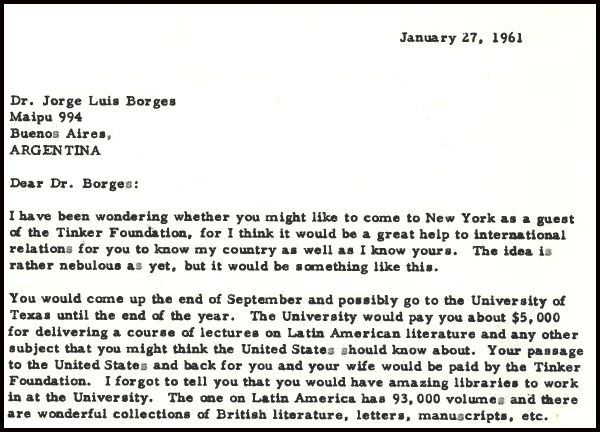Biography of Edward Larocque Tinker
Researched and written by Dr. Kathleen Waldron
Director emerita of the Tinker Foundation
December 2024
In 1959, at age 78, Dr. Edward Larocque Tinker established the Tinker Foundation as a trust for philanthropic purposes focused on Latin America. It eventually became a private foundation led by Dr. Tinker and Martha Muse, a long-time family friend, who was named as its first executive director. Together, they guided the organization for nine years before he died in New York City. Dr. Tinker viewed the Foundation as a way to build greater understanding between the United States and Latin America. This ethos was reflected in his belief that “the future freedom and prosperity of the peoples of the New World depends upon [their mutual] trust, friendship, and cooperation.”
Dr. Tinker, born on September 12, 1881, was a banker, lawyer, author, and Latin American affairs specialist who traveled extensively throughout his life in Mexico and South America. He graduated from Columbia University in 1902 and studied law at New York University, after which he practiced law in New York City for several years. However, a longstanding interest in Mexico, spurred by his parents’ travels there during his childhood, led Dr. Tinker to relocate to El Paso, Texas, where he worked with the El Paso & Southwestern Railroad and was later involved in setting up a railway safety organization. His work coincided with the early stages of the Mexican Revolution, an experience he describes in his memoir, New Yorker Unlimited (1970).
Dr. Tinker eventually returned to New York and, in 1919, founded the Tinker National Bank in Setauket, Long Island, where the Tinker family had an estate. He served as president and chair of the board for over a decade before selling the family interests in 1945.
The Tinker family had a long mercantile and banking history in New York and Boston and traced its origins to the early settlers of New England. In the nineteenth century, his grandfather, Edward Greenfield Tinker, owned a shipping company, trading goods between the United States and London. His father, Henry Champlin Tinker, was the first president of the Liberty National Bank of New York City and director of several companies, including the Fidelity Phoenix Insurance Company. Investments in New York City real estate further enhanced the family fortunes, allowing Edward’s father, Henry, to purchase land in Setauket, Long Island, where he built substantial homes for various family members. Edward’s mother, Louise Larocque Tinker (1859-1940), volunteered in France after the First World War, assisting children and families displaced by the war. Her work was recognized twice by the French government and undoubtedly influenced the philanthropic interests of her son and daughter, Annie Rensselaer Tinker (1884-1924), a noted suffragist.
Dr. Tinker, an accomplished equestrian, had a life-long interest in the culture of the cowboy both in the United States and Latin America. He and his second wife, Frances McKee, whom he married in 1916, collected artifacts, paintings, prints, and other memorabilia of the U.S. Western cowboy, as well as the gauchos, huasos, llaneros, and vaqueros of Latin America. Dr. Tinker donated his considerable collection of books on the horsemen of the Americas and gaucho-related gear, including finely tooled saddles and bridles, to the University of Texas at Austin. In 2010, the Tinker Foundation and the University authorized the loan of the collection to the Chisolm Trail Heritage Museum for permanent exhibition. Dr. Tinker also studied the Franco-American culture of New Orleans, collecting over 5,000 books, plays, and newspapers published in French in Louisiana, which he donated to the American Antiquarian Society where he had served as a Councilor for many years.
Dr. Tinker not only wrote extensively about the customs and practices of the horsemen but also about cultural topics relevant to Latin America and Louisiana. In all, he authored over 50 books and articles, including Toucouton, a 1928 novel about pre-Civil War Creole life in New Orleans, and Centaurs of Many Lands, his final book published in 1963. He commissioned a series of “gaucho movies” from the noted Argentine filmmaker and ethnographic film pioneer Jorge Prelorán, which were shown on television. The restored films are housed at the Harry Ransom Center in Austin, Texas.
Dr. Tinker was a book reviewer at the New York Times for many years and lectured at universities across the United States and Latin America. He received numerous honorary doctorates and awards from various universities in the U.S. and abroad.
Dr. Tinker’s lasting philanthropic achievement, the Tinker Foundation, was built on the premise that personal relationships were important for international understanding. He poignantly wrote, “we must put a heart into our relations with Latin America.” This belief was mirrored in his own life, as he sustained decades-long friendships with notable writers, artists, academics, and political leaders across Latin America.
A letter from Dr. Tinker inviting the renowned Argentine writer and critic Jorge Luis Borges to consider a lecturer position at the University of Texas. While at the University, Borges taught courses on poetry and delivered a public lecture on Walt Whitman. The Foundation considers him the first Tinker Visiting Professor, a program that has brought more than 500 scholars, practitioners, and artists to U.S. universities.
However, Dr. Tinker understood that issues and priorities could change over time and thus did not restrict the Foundation’s future direction. In his words, written in 1962, “Changes are occurring in the world with such horrifying speed that I do not want to place a dead hand on the future decisions of those who will inherit the direction of the foundation, for what is important today may not be so tomorrow. Above all, I do not wish to limit its power to experiment in funding the best means to accomplish its objectives. This I consider most necessary.”
